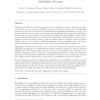Free Online Productivity Tools
i2Speak
i2Symbol
i2OCR
iTex2Img
iWeb2Print
iWeb2Shot
i2Type
iPdf2Split
iPdf2Merge
i2Bopomofo
i2Arabic
i2Style
i2Image
i2PDF
iLatex2Rtf
Sci2ools
149
click to vote
PE
2011
Springer
2011
Springer
Passage-time computation and aggregation strategies for large semi-Markov processes
High-level semi-Markov modelling paradigms such as semi-Markov stochastic Petri nets and process algebras are used to capture realistic performance models of computer and communication systems but often have the drawback of generating huge underlying semi-Markov processes. Extraction of performance measures such as steady-state probabilities and passage-time distributions therefore relies on sparse matrix–vector operations involving very large transition matrices. Previous studies have shown that exact state-by-state aggregation of semi-Markov processes can be applied to reduce the number of states. This can, however, lead to a dramatic increase in matrix density caused by the creation of additional transitions between remaining states. Our paper addresses this issue by presenting the concept of state space partitioning for aggregation. Aggregation of partitions can be done in one of two ways. The first is to use exact state-by-state aggregation to aggregate each individual state w...
Atomic Partition Aggregation | Exact State-by-state Aggregation | Optimization | Passage-time Analysis | PE 2011 |
Related Content
| Added | 14 May 2011 |
| Updated | 14 May 2011 |
| Type | Journal |
| Year | 2011 |
| Where | PE |
| Authors | Marcel C. Guenther, Nicholas J. Dingle, Jeremy T. Bradley, William J. Knottenbelt |
Comments (0)

